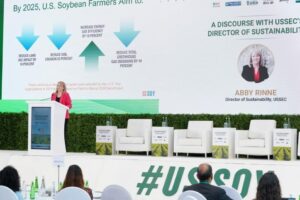
The event championed the need for innovation and climate-smart food systems to sustainably feed the world.
Agribusiness leaders and industry visionaries gathered in Dubai to attend the U.S. Soybean Export Council (USSEC)’s annual Sustainasummit 2024 conference. Discussions revolved around smart conservation initiatives, sustainable agricultural practices, groundbreaking progress in food cultivation, production, distribution, and consumption. According to the World Bank, South Asia is experiencing a “new climate normal” 1 which is referred to as unpredictable weather including heat waves, cyclones, droughts, and floods. With a growing population and rising temperatures, South Asia needs to accelerate its efforts in addressing the impact of climate change on the region’s food and nutrition security.
Kevin Roepke, Regional Director, South Asia and Sub-Saharan Africa (SAASSA) at USSEC emphasized the need for building climate resilient food systems. He added, “With USSEC’s Sustainasummit, we aim to ignite strategic dialogue among the food and agri- businesses about the importance of using sustainable ingredients such as U.S. Soy to develop a robust global food system. U.S. Soy is uniquely positioned to sustainably meet South Asia’s growing demand for protein through its high nutritional bundle and reliable supply.
“Today’s global consumers are increasingly vocal about their desire for sustainable products and greater transparency in raw material sourcing” added Deeba Giannoulis, Regional Head of U.S. Soy Marketing & Sustainability – SAASSA at USSEC. Sustainasummit represents our commitment to establishing comprehensive sustainability standards across industries, enabling businesses to procure resources responsibly. For instance, the ‘Fed with Sustainable U.S. Soy’ label, endorsed by eleven poultry companies in Sri Lanka, is just one example of our efforts.
This initiative ensures adherence to the stringent U.S. Soy Sustainability Assurance Protocol (SSAP), guaranteeing sustainable practices in areas such as biodiversity and production methods of U.S Soy Farmers. As we champion initiatives like Sustainasummit, we aim to catalyze similar innovations that pave the way for a greener, more nutritious future.”
Addressing the potential of science to achieve food security, Dr. Mahaletchumy Arujanan, Global Coordinator at ISAAA-BioTrust and Executive Director of the Malaysian Biotechnology Information Centre (MABIC) added “The pillars for sustainability are built upon science. Science provides the solution to reduce the footprint created by the agriculture industry by reducing greenhouse gases, increasing productivity, responsibly using chemicals, reducing waste and optimizing the use of resources. Science supports food security and boosts the economy. Biotechnology is at the centre of this, supporting environmental and socioeconomic wellbeing.”
Reflecting on U.S. Soy’s lowest carbon footprint compared to soy from other origins, Abby Rinne, Director of Sustainability at USSEC stated, “Our U.S. Soy farmers are committed to continuous improvement through innovation and technology to achieve their 2025 sustainability goals. This includes reducing total greenhouse gas emissions and land use by 10% while increasing energy efficiency by 10%. U.S. Soy farmers are leading the way by producing more while using fewer resources, implementing farming practices that reduce carbon footprint, and are helping in preserving forestland.”
One recurring theme from Sustainasummit 2024 was that agriculture is not the problem; it is the solution. Highlighting the need for a paradigm shift in policy frameworks to combat climate challenges, Frank M. Mitloehner, Professor in Animal Science at UC Davis, California, added “Farmers can be a part of a climate solution but to achieve this, we need to unleash the potential of voluntary and incentives-based policies.”
During Sustainasummit, there was a noteworthy celebration as two more U.S. Soy customers from Sri Lanka; Imo Chicken and Agro Private Ltd and Fortune Agro Industries Pvt. Ltd signed licensing agreements to adopt the ‘Fed with Sustainable U.S. Soy’ label on their packaging. This brings the total number of label users to eleven in less than a year. By embracing the label, U.S. Soy customers aim to elevate and differentiate their products in the market as they demonstrate their commitment to sustainability and supply chain transparency.
Supported by the Illinois Soybean Association, Iowa Soybean Association, and the United States Department of Agriculture (USDA), Sustainasummit 2024 hosted compelling conversations with industry thought leaders, including; Stan Born, USSEC’s Chairman, Suzanne Shirbroun, President, Iowa Soybean Association, Kirk Leeds, CEO, Iowa Soybean Association, Brent Swart, President Elect, Iowa Soybean Association, Puneet Tomar, Global Project Manager at Euromonitor International, Sameera Fernandes, Director Corporate Affairs & Sustainability, Century Financial, Sohel Tanvir Khan, Business Director, ACI Logistics Ltd (Shwapno) and Sanjeev Astana, CEO, Patanjali.
ENDS
Photo Caption- Abby Rinne, Director of Sustainability at USSEC presenting about U.S. Soy’s commitment to sustainability.
